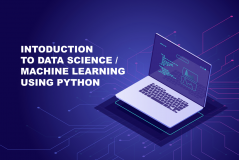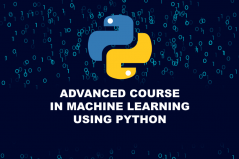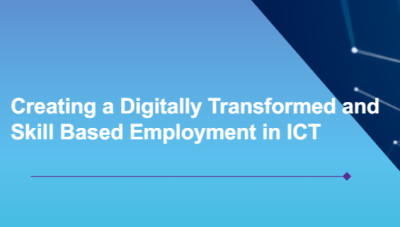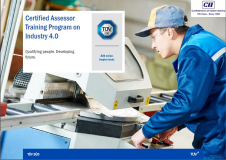Course Catalog


10 Lessons
Digital Revolution is disrupting every Industry and is offering unparalleled opportunities for value creation. Research indicates that I4.0 would play a pivotal role in boosting the manufacturing sector’s share to 25% of the India’s GDP *. As manufacturing companies adopt and benefit from the I4.0 disruption by connecting their people, processes and machines , it is imperative that they adopt the best practices and learnings from the industry. CII and Hitachi Consulting presents "Your Roadmap to Intelligent Manufacturing" - 4 days masterclasses to develop awareness on the right ingredients and approach to design and execute their digital vision. The sessions have been designed to help participants gain knowledge on the best practices in their journey of becoming an intelligent manufacturer.
Add to cart

92 Lessons
00:00:00.000000 Hours
ABOUT THE COURSE: This curriculum is developed to help participants appreciate data science and train them to perform data science activities Intended audience: B.Com, B.Sc. graduates, B.Tech/B.E graduates, management studies and working professionals Pre-requisites: Some exposure to high school mathematics and knowledge of programming basics (preferred) Learning Objectives: • Introduce Python as a programming language for data science • Introduce the statistical foundations required for data science • Introduce data visualization techniques • Introduce machine learning algorithms Learning Outcomes: • Describe a flow process for data science problems (Remembering) • Classify data science problems into standard typology (Comprehension) • Develop Python codes for data science solutions (Application) • Correlate results to the solution approach followed (Analysis) • Assess the solution approach (Evaluation) Components of the course: • Videos will be released on a weekly basis • Online live discussions addressing the participants’ doubts, will be held at regular intervals • Each module will have an assignment that must be completed to proceed with other modules • Participants can post their queries on a question and answer forum • Final exam: Participants will be assessed through a combination of command-based Python questions, theoretical, interpretation aspects of the course and solving practical capstone case study using Python
Add to cart

9 Lessons
Cyber security is disruptive and game changing. Cyber security threats to organizations as well as to individuals, are growing exponentially. Highly publicized data breaches have caused huge financial as well as reputational losses to global corporations. Cyber-attacks also have the potential to impact national security and well-being of citizens. Threats are proliferating faster than our ability to respond to them which means that there is a great demand for cyber security experts. Forbes estimates that by 2020, there will be as many as 3.5 million unfilled cyber security positions in the industry. Cyber security skill development is a national priority. The CII – Tata Communications Centre for Digital Transformation (CDT) is hosting the 12th Edition of Training course on Cyber Security with Certification This would be useful to strengthen skills of cyber security professionals working with private and government organizations (institutions, industry bodies, IT/ITeS companies, manufacturing units, individuals, academicians, students, college freshers and Intelligence and/or emergency services), Corporations (including MNCs and global organizations, SMEs and start-ups) and NGOs. It would also be open to graduates desirous of pursuing a career in cyber security. KEY TAKEAWAYS • Interactive session on Latest Technologies • Learn About Best Technologies in Cyber Security • Training by Active Practitioner • Industry accepted Curriculum • Live Demonstrations of Attack • Expert Accredited Certificate COURSE COVERAGE • Introduction to Security and Risk Management • Cyber Resilience, BCP, Crisis Management • Disaster Recovery Management • Evolving Threat Landscape in Current Economy • Exploring the Cyber Attack Vector • Introduction to Cyber Security Technologies • Information Technology Asset management • Evolving Role of CISOs in Present Scenario • Information Security Standards • Cyber Policy and Frameworks • Cloud Infrastructure & Cloud Security • Network, Database and Application Security • Cyber Laws, Cyber Crime & Investigations • Security Audits - Global Risk & Compliance DURATION: 16 Hrs
Add to cart

152 Lessons
00:00:00.000000 Hours
ABOUT THE COURSE: This curriculum is developed to help participants appreciate data science and train them to perform data science activities Pre-requisites: Some exposure to high school mathematics and knowledge of programming basics (preferred) Learning Objectives: 1. Introduce Python for advanced machine learning 2. Introduce cutting-edge machine learning algorithms 3. Introduce case studies to provide an application perspective for the techniques learnt Learning Outcomes: • Describe a flow process for data science problems (Remembering) • Classify data science problems into standard typology (Comprehension) • Develop Python codes for data science solutions (Application) • Correlate results to the solution approach followed (Analysis) • Assess the solution approach (Evaluation) Components of the course: • Videos will be released on a weekly basis • Online live discussions addressing the participants’ doubts, will be held at regular intervals • Each module will have an assignment that must be completed to proceed with other modules • Participants can post their queries on a question and answer forum • Final exam: Participants will be assessed through a combination of command-based Python questions, theoretical, interpretation aspects of the course and solving practical capstone case study using Python
Add to cart

24 Lessons
January 2021 | CII-IGBC’s Certification Course on Green Built Environment : 18 - 29 January 2021
Add to cart

1 Lessons
Presentation on creating a digitally transformed and skill based employment in ICT by Vinutha Rao, Vice President, HCL Technologies Ltd. at the CII Connect Madurai 2020 held from 28-29 October 2020.
Add to cart

23 Lessons
00:00:00.000000 Hours
Industry 4.0 is gathering momentum globally, and many companies are looking to adopt technologies such as data analytics and Industrial Internet-of-Things (IIoT) to improve their manufacturing competitiveness. While the Industry 4.0 concept offers significant potential, the requirements for a successful transition go far beyond technology change. The Assessor program aims to develop Industry 4.0 assessment competency among the participants through practical exercises. The session is conducted in three phases to enable the participants to apply learning to their organizational setting. The faculty will guide participants for the effective assessment. The participants can independently do self-assessment after the intensive course of 5 days. The focus will be on assessment outcome for business excellence.
Add to cart

42 Lessons
00:00:00.000000 Hours
The EHL Education group has been serving up excellence in hospitality and education since 1893 when its flagship institution became the world’s first hotel school, founded by Jacques Tschumi. Over the past 125 years, the hotel school (EHL Ecole hôtelière de Lausanne) grew into a thriving international university with a consulting branch and academic partnerships, under the ownership of the EHL foundation. The growth and diversification of our activities lead to the creation of EHL Education Group, to allow greater synergies between these academic and business structures. The EHL Education Group has three campuses across the globe (Lausanne, Passugg & Singapore). Each school campus has its own unique offer of programs, services, and specialized activities in relation to the industry. EHL is always a step ahead of its time. From a small Swiss hotel school, EHL has evolved into an international group that offers a large and complete range of learning and business solutions. To augment the level of excellence in hospitality worldwide, our Group produces research projects, offers consulting services, nurtures startups and generates an important innovation pipeline. Above all, EHL is a state of mind, based on our forward-looking values and vision. EHL consistently ranks among the world’s leading universities for hospitality management earning multiple awards (#1 University in Hospitality & Leisure Management, 2020 & 2019, Best Hospitality & Hotel Management School in the World, 2019 & 2020) for outstanding excellence based on criteria such as academic quality, employer reputation and contributions to academic research. EHL Group has also received numerous awards recognizing its qualities as an employer and international company, which includes an award for the Top 50 Education Companies by the Global Forum for Education and Learning, Dubai, 2019. An integral part of the EHL Group is its consulting branch EHL Advisory Services, formerly named Lausanne Hospitality Consulting (LHC), this branch was created as EHL’s internal training resource in 1967. It provides business consulting services and tailor-made training programs for hospitality business and other organizations, and it offers education development services and certification for hospitality learning centres worldwide. With a team of leading subject experts, we develop applicable, innovative solutions that help businesses, institutions and governments around the world to prepare for future excellence with a commitment to academic rigour, service culture, people development and quality assurance. Our learning solutions and courses under this branch are designed leveraging the deep expertise of the knowledge base of EHL's subject matter experts and using relevant industry experts. The amalgamation of these components brings a tremendous amount of practicality and applicability to the components of the solution and courses. As part of our ambition of imparting knowledge and competencies to a million individuals worldwide, we have collaborated with CII GEKO to bring you some of our signature courses. We look forward to positively impacting your learning and professional journey through these courses. “The single biggest problem in communication is the illusion that it has taken place”- George Bernard Shaw Effective Communication is a mandatory skill for any individual. Not only does it contribute to their professional growth, but also leads to their personal development. The benefits of effective communication are countless- free flow of information, empowerment, building relationships and trust, increased productivity, higher employee morale to just name a few. A large portion of our lives is spent communicating with others. Sharing your thoughts and understanding another person’s thoughts are essential skills for functioning in any professional work environment By the end of this course, you will be able to have an understanding of the following - Knowledge 1. Explain the value of a Communication Model 2. Define how to state and articulate your views 3. Explain the skill of active listening 4. Identify the right questioning techniques 5. Recognize the ACBDE model for written communication 6. Understand the STAR model for Presentation skills Competencies 1. Demonstrate the appropriate skills to Communicate effectively with their Customers 2. Apply the skill of Active Listening during interactions with Customers. 3. Inquire to drill down to a deeper level of Response when asking questions to their Customers 4. Apply the “ACBDE” model for written communication 5. Use your Presentation design and delivery skills to become a STAR Presenter Mindset 1. Appreciate the impact Effective Communication can have in a professional and personal environment 2. Choose the right skills to Communicate with stakeholders 3. Construct written communication using the right elements
Add to cart

111 Lessons
00:00:00.000000 Hours
Electronic Tendering ("eTendering") This Module will give you detailed information about the bidding process, protocol to be followed during the bidding process. Do's And Don't of the Bidding process, the concept of Bidding, how to win a tender? How to Map Dsc, Java. What are the Protocols of Mapping? What are the mandatory elements of mapping? What are the browsers required for Bidding?
Add to cart